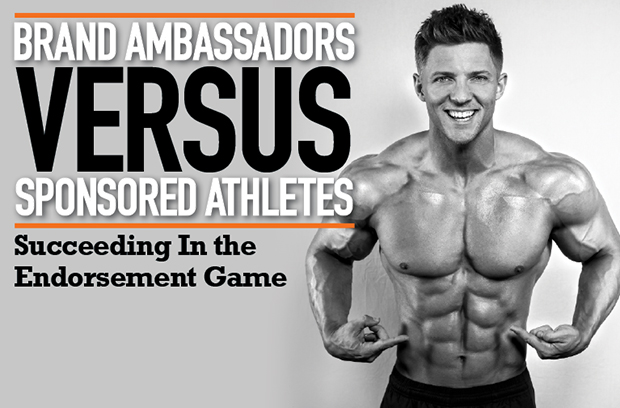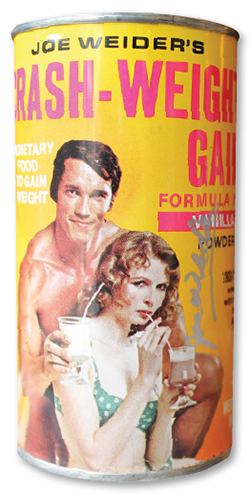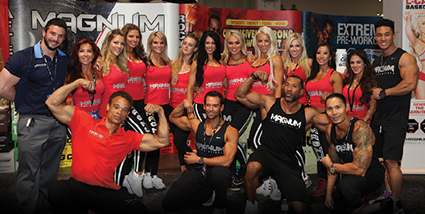BRAND AMBASSADORS VERSUS SPONSORED ATHLETES

How You Can Succeed In the Athlete Endorsements Game
As the bodybuilding and fitness industry continues to grow at an exponential rate, the business potential for athletes is changing. With the surge of social media, the ability for companies to promote their products has rapidly expanded and has even changed where and how they spend their marketing dollars. Likely, as you scroll through your social media platform of choice, it seems as though every other “brand ambassador” is promoting or selling a product and offering the use of their personal discount code! Are these people sponsored by these companies? What the heck is a brand ambassador? And who directly benefits from these posts?

 The Influence of Social Media
The Influence of Social Media
Love it or hate it, social media is here to stay. It has changed the landscape of many industries—in this case, bringing fitness and marketing together. Media platforms such as Instagram, Facebook, YouTube and Snapchat have opened the door to an initially low-cost form of advertising. Users can post (almost) anything they wish, from educational information about supplements to clothing and even product reviews. Users can and often do highlight companies or promote their own skills and services online.
Instagram Explosion
Instagram has quickly become one of the most popular social networks, hitting 700 million monthly active users as of April 2017. This has been an increase of more than 600 million users in just four years, making it a pretty solid market to reach for potential business exposure. The versatile app is the perfect platform for people to promote and advertise through the use of images and videos, along with the ability to write up to 2,200 characters in the caption. With the recent addition of Instagram Stories, users are now able to provide short snapshots of their lives without needing to write posts. These features allow users many methods to get their message out to followers throughout the day.
Social Media Brand Ambassadors
Alongside the growth of social media platforms, “social media influencers” have emerged. Someone fulfilling this title has varying degrees of credibility in his or her industry, has built a solid following, and posts consistently in an effort to persuade others. These influencers are a jackpot for companies looking to expand their exposure with minimal cost.
Word of mouth is one of the best forms of marketing, and social media has digitalized this and elevated it to a new level. Word of mouth now extends much further than someone’s family, friends, and co-workers. Influencers with large followings can easily reach hundreds or even thousands of people with a simple post. Consequently, companies are looking to recruit them as a marketing outlet, offering them ambassador roles or signing them on as sponsored athletes.

Brand Ambassador or Sponsored Athlete?
Knowing the difference between a brand ambassador and a sponsored athlete is imperative to understanding the market—especially if you’re approached to fulfill one of these roles. Originally, sponsorships were the norm, meaning companies would recruit athletes to become exclusive parts of their teams. Traditionally, a contract would be signed by both parties stipulating the expectations and reimbursements of both sides. Sponsorships range in benefits for the athletes, from a regular paycheque to competition expense coverage or regular shipments of free products of the athlete’s choosing. Often, athletes are required to promote the company in a set number of social media posts per month, attend expos to work company booths, or attend photo shoots for marketing material at the company’s request. Ideally, the company would also promote the athlete through its own social media platforms.
 Sponsored Athlete
Sponsored Athlete
As a sponsored athlete, you get compensated more than you would as a brand ambassador. As such, you would be expected to exclusively promote your sponsors company and its product. For example, as a sponsored athlete of supplement Company A, you wouldn’t be allowed to promote a product from the supplement line of Company B. Doing so would likely garner you a warning or could even be grounds for dismissal from the roster. Typical compensation ranges from as low as getting a 20 percent discount off buying supplements from the sponsor (no kidding) to as high as the reported $500,000 per year that one Olympia winner was allegedly making. The bigger the star and the bigger the sponsor, the more lucrative the contract becomes. Athletes are expected to travel around the world holding seminars, attending store openings, doing photo shoots, working tradeshows, and helping their sponsor sell more products to help pay for their contract! It’s a business, and the athlete is there to help their sponsor sell more products than it would if it didn’t have the athlete endorsing its products.
Brand Ambassadors
On the other hand, brand ambassadors help promote a brand or product, but without a contract in place and with fewer reimbursements or perks. They’re commonly provided affiliate links that their social media followers can use to receive a discount (generally 10 to 15 percent) off products. In some cases, ambassadors may receive kickbacks from people using their codes, either in the form of commission from sales using their codes, or their own discounts on products. There is the potential for a company to provide ambassadors with free product, with the hope that they will post about it for people to see, but that’s an additional perk and not a standard agreement feature. What starts as an ambassadorship may develop into a sponsorship, if the person proves that they are able to sell more products for the company from their association. If they can’t, then why would the company sign them?
Your Followers Are Worth Something
Using sponsored athletes or brand ambassadors to reach potential customers is a form of marketing for the company. Reaching the athlete’s followers will extend the company’s exposure within the industry. Your followers look at your material because they respect your knowledge or opinion on products. Therefore, when you endorse something, they’re more inclined to try it—especially when you can offer them a discount. When a company enlists the help of its brand ambassadors in spreading the word of its products, it can potentially reach a much wider audience—possibly people who don’t (yet) follow the company. Be sure to know the worth of this audience and treat your followers with respect by introducing them to products you truly believe in and use yourself.

#Sponsored?
When a search for the hashtags “sponsored,” “sponsor,” and “ad” was performed on Instagram, a whopping 2.8 million posts were found. This only included posts from users who had more than 1,000 followers, assuming that users with fewer followers wouldn’t actually be getting paid for their posts due to their small reach. Regardless, this was estimated to total more than $1billion in an annual financial exchange. These results should be taken with a grain of salt, though. Anyone can include whatever hashtag they wish on their posts. Including “#sponsored” doesn’t necessarily mean they were paid for their efforts. Also, a post’s price tag varies by company and person; it could equate to a product as payment rather than cash. Social media prowess doesn’t automatically equate to your meal ticket!
How to Become a Brand Ambassador or Sponsored Athlete
One of the main points to consider is the changing environment of the fitness industry. The simple business principle of supply and demand is at work here: With the influx of athletes who are happy to promote a product for a small discount, the less need there is for companies to fully sponsor athletes. They’re already getting the impact they want without having to put a lot of money into someone. Thus, the number of true sponsorships offered by companies is quite low, with a massive number of athletes chasing them.
In your journey to landing a deal, consider the image your profile paints of you, as this will directly affect your odds of being hired for a promotional role. Companies will look beyond the simple number of followers on your bio page, due to the practice of people buying fake followers to look impressive. If your bio shows 50K followers yet your posts only get 100 likes and one or two comments, a red flag will be raised. And since you can also buy more likes on posts and views on YouTube videos, don’t think that companies don’t already know this trick! Be honest and build a real following and a genuine fan base. Additionally, taking the time to respond to comments left on your posts will create a dynamic profile and encourages more people to get involved and follow you. Companies would rather work with positive, upbeat, and social athletes, as they will help to promote a positive image of their products.
With the saturation of fitness personalities in the industry at an all-time high, athletes need to prove themselves as beneficial commodities to companies. Acknowledging the fact that working with a company is going to be just that—work—is equally important. You’ll have to put work into building yourself up as a brand in order to get noticed, and then continue to work to maintain whatever deal you land. Unfortunately, you can be easily replaced, and there’s likely a long line of athletes waiting to do just that!
If a company contacts you to work together, it may be tempting to quickly accept any deal it offers, but you should take the time to evaluate it with a critical eye. Is it fair? Do both sides benefit? Are you satisfied with the terms? And is it a company you’re proud to stand behind? Negotiating agreement terms should be an open discussion between both sides to ensure everyone can fulfill their role and is happy with their involvement. In the end, whether you’re an ambassador or a sponsored athlete, you are in a partnership with the company, and as such, need to be in agreement with the terms and deliver on your end of the deal to stay in good standing. Happy promoting!
 HOW TO GET YOURSELF NOTICED
HOW TO GET YOURSELF NOTICED
If your goal is to catch the eye of a company and land a deal with it, the following tips may help boost your potential:
• Have a public profile. This may seem obvious, but it needs to be said.
• Post regularly. You don’t need a set schedule, but you should keep your feed moving with regular posts to provide new content for followers.
• Be you. Promote products you truly use and enjoy, and speak (type) in the same fashion as you would in person—fakeness can be sensed online.
• Be loyal. Find a company you want to work with and stick to posting about it rather than jumping from company to company.
• Get educated. Sharing knowledge about a product will go much further than simply saying, “I love this, and you will too!” Tell followers what benefits the product will bring them.
• Tag the company. When you promote a product, be sure to tag the company so it gets notified. Simply adding a hashtag to your caption won’t notify it of the post.
• Be patient and realistic. Sponsorships won’t just land in your lap because you’ve made a few posts about a company. You can also try contacting it directly and promoting yourself. Combining this with regular, intelligent posts will let it know how serious you are.

